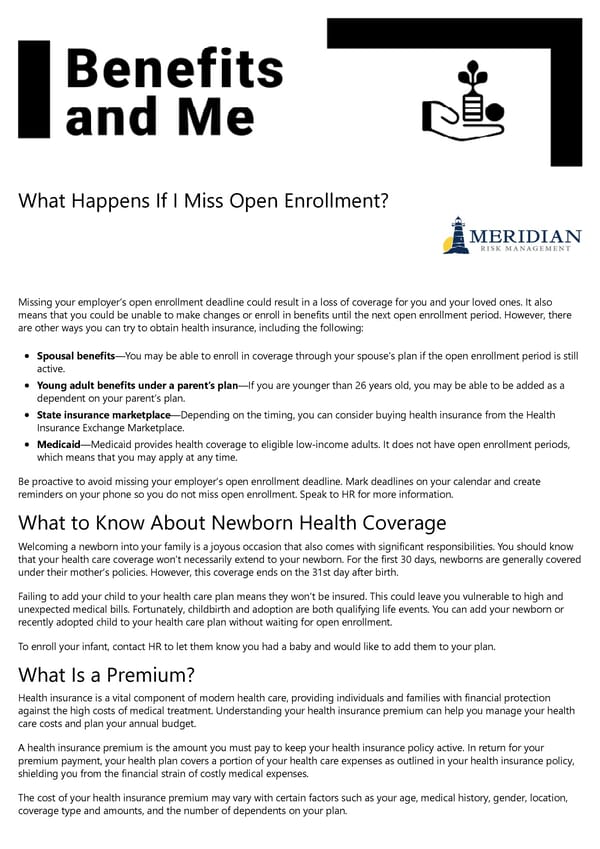What Happens If I Miss Open Enrollment? Missing your employer’s open enrollment deadline could result in a loss of coverage for you and your loved ones. It also means that you could be unable to make changes or enroll in benefits until the next open enrollment period. However, there are other ways you can try to obtain health insurance, including the following: Spousal benefits—You may be able to enroll in coverage through your spouse’s plan if the open enrollment period is still active. Young adult benefits under a parent’s plan—If you are younger than 26 years old, you may be able to be added as a dependent on your parent’s plan. State insurance marketplace—Depending on the timing, you can consider buying health insurance from the Health Insurance Exchange Marketplace. Medicaid—Medicaid provides health coverage to eligible low-income adults. It does not have open enrollment periods, which means that you may apply at any time. Be proactive to avoid missing your employer’s open enrollment deadline. Mark deadlines on your calendar and create reminders on your phone so you do not miss open enrollment. Speak to HR for more information. What to Know About Newborn Health Coverage Welcoming a newborn into your family is a joyous occasion that also comes with significant responsibilities. You should know that your health care coverage won’t necessarily extend to your newborn. For the first 30 days, newborns are generally covered under their mother’s policies. However, this coverage ends on the 31st day after birth. Failing to add your child to your health care plan means they won’t be insured. This could leave you vulnerable to high and unexpected medical bills. Fortunately, childbirth and adoption are both qualifying life events. You can add your newborn or recently adopted child to your health care plan without waiting for open enrollment. To enroll your infant, contact HR to let them know you had a baby and would like to add them to your plan. What Is a Premium? Health insurance is a vital component of modern health care, providing individuals and families with financial protection against the high costs of medical treatment. Understanding your health insurance premium can help you manage your health care costs and plan your annual budget. A health insurance premium is the amount you must pay to keep your health insurance policy active. In return for your premium payment, your health plan covers a portion of your health care expenses as outlined in your health insurance policy, shielding you from the financial strain of costly medical expenses. The cost of your health insurance premium may vary with certain factors such as your age, medical history, gender, location, coverage type and amounts, and the number of dependents on your plan.
 Live Well, Work Well Newsletter January 2024 combined Page 6 Page 8
Live Well, Work Well Newsletter January 2024 combined Page 6 Page 8